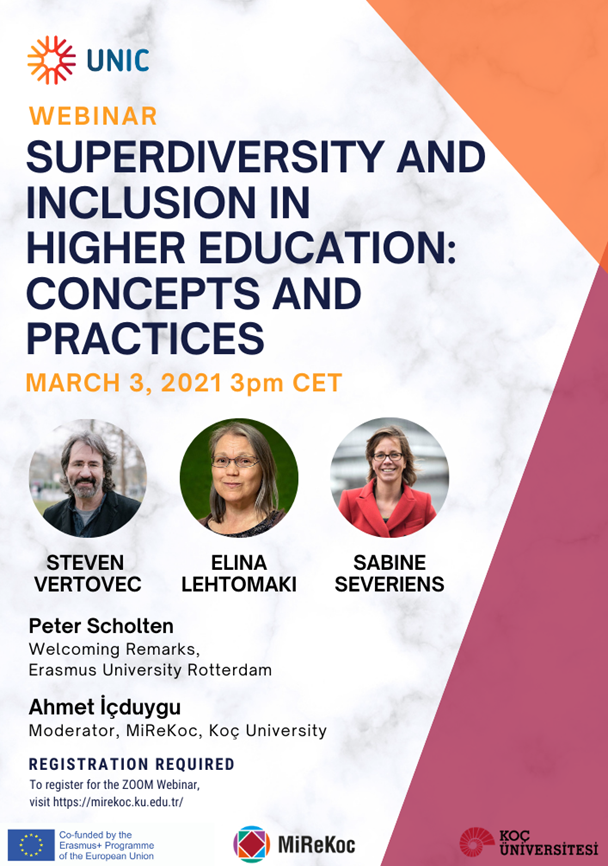The event will be held on March 3rd, 2021 at 3pm CET by Prof. Steven Vertovec (Max Planck Institute for the Study of Religious and Ethnic Diversity), Prof. Elina Lehtomaki (University of Oulu) and Prof. Sabine Severiens (Erasmus University Rotterdam).
More information
The event will be held in Zoom and be open to public. Registration is required through this link. The access link for the Webinar will be sent immediately and a reminder will be sent in 1 day, and again 1 hour prior to the scheduled event.
The launch event of the UNIC Superdiversity Academy and the first one of the UNIC Seminar Series is organized by the UNIC team at Migration Research Center at Koç University, in collaboration with the UNIC team of Erasmus University.
Tentative Program of the Webinar
- Introduction by Prof. Peter Scholten, the coordinator of UNIC, about the UNIC alliance and the UNIC Seminar Series
- Introductions and Moderation by Prof. Ahmet İçduygu
- Talk by Prof. Steven Vertovec on Superdiversity and Social Complexity
- Talk by Prof. Elina Lehtomaki on Inclusive Higher Education
- Talk by Prof. Sabine Severiens on Diversity and Educational Inequality
- Question and Answer Session
Short-biographies of the panelists
Prof. Ahmet İçduygu is the Director of the Migration Research Center at Koc (MiReKoc). He holds a dual appointment as a full professor at Koç University, Istanbul, one in the Department of International Relations and the other is in the Department of Sociology. He is also the editor of the International Migration Journal. He holds a Ph.D. in Demography from the Australian National University.
Prof. Elina Lehtomäki is professor of Global education at the University of Oulu and leads the research team Education, Diversity, Globalisation and Ethics (EDGE) which informs the two-year master’s programme in Education and Globalisation, and the five-year Intercultural Teacher Education. Her research interests focus on the social meaning of education, global education and learning, responsibility and internationalization in higher education, culturally responsive education and social inclusion. She has worked with international agencies and is a member of the Academic Network for Global Education and Learning, and the founding member of the Finnish Global Education Research network.
Prof. Peter Scholten is Professor of Public Administration, with a full chair in the Governance of Migration and Diversity, at the Erasmus University of Rotterdam. His research focuses on amongst others on the governance of migration and migration-related diversity, multi-level governance, comparative public policy, and the relationship between science and politics in the field of migration. Peter is director of IMISCOE, Europe’s largest academic research network on migration, integration and social cohesion. Furthermore, he is editor-in-chief of the journal Comparative Migration Studies (CMS) and associated editor of the Journal of Comparative Policy Analysis. As of 2020, Peter will also be alliance coordinator of the European University of Post-Industrial Cities (UNIC).
Prof. Sabine Severiens is professor of Educational Sciences at the Department of Pedagogical and Educational Sciences of Erasmus University Rotterdam. The main theme in her scientific work is diversity and educational inequality, from the perspective of the teacher (culturally responsive teaching) as well as the student (motivation, integration and the learning environment). One of the focal points in her current work is teaching in classrooms with students from diverse backgrounds and strengthening professional capacity in this particular area.
Prof. Steven Vertovec is Founding Director of the Max Planck Institute for the Study of Religious and Ethnic Diversity, Göttingen, Germany. He is author of five books, including Transnationalism, and editor of thirty-five volumes including the International Handbook of Diversity Studies. He has acted as consultant for numerous agencies, including the European Commission, World Bank and UNESCO.
Further information concerning the webinar can be found at the MiReKoc Website


